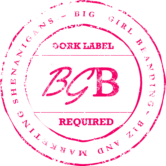Everyone should have goals for their business, whether personal or professional. I’m sure you’ve heard the saying that without planning you plan to fail. That said, here are 12 things I think are important goals to set for yourself and your biz. These are 12 things I strive for myself, and feel could be a good fit for you as well.
I am sure there are plenty of other important things I’m just not thinking of at the moment, so if you have ideas of your own, please leave them in the comments below. I’d love to hear them and I’m sure the rest of BGB’s readers would love to hear them as well!
1. Map out a business plan. Even if it’s a loose one, you need SOME sort of plan this year to keep your business on track, measure your goals, and reach milestones. Make your businesses milestones specific, attainable, and set a deadline to reach them. Use a mindmap, write it down on paper, or go ‘whole hog’ and create an honest to goodness business plan. (With a little help from a professional if you need it!)
2. Define or refine your brand. If you haven’t yet thought about your brand strategy… start thinking and planning. If you already have one in place… refine it and figure out what is working well and what isn’t working well. Turn your brand strategy into a well-oiled machine that works for you and your business 24/7.
3. Ramp up your marketing efforts. See 31 Ways to Advertise Your Business Locally if you are stuck for ideas. If you already have systems in place, refine them… review what is working and if it’s not, scrap it. Create a marketing schedule. For instance, devote one day a week ONLY to marketing your business. Or devote one hour each day ONLY to marketing your business. If you only market ‘on occasion’ you can bet that when times are slow you will be floundering. Marketing should be a constant priority.
4. Leverage social media. Lead generation can be hard. Leveraging social media can help massively if you learn how to do it right. Stop sitting on the fence and wondering if this whole ‘social media’ thing is just a fad. It’s not and it’s only going to get bigger… so start learning to use it effectively for your business, or expect your competition to do it for you.
5. Partner with other businesses who offer complimentary services. You’re getting two customer bases for the price of one and vice versa. It’s a win-win situation and can boost sales, exposure and revenue for both businesses. Remember that helping others succeed increases your chances of succeeding tenfold.
6. Learn the value of email marketing. If you don’t already know about list building, learn. If you aren’t already capturing the contact information of your web visitors, start. If you don’t know how to even begin doing either of those things, hire someone to teach you or do it for you.
7. Create a business budget. If you have an online business, it’s likely a huge budget will not be necessary. If you have a brick and mortar however, you could have quite a few business expenses and creating a budget for your business will help you keep those expenses reasonable and help you evaluate where you can possibly cut costs to increase your bottom line.
8. Legalize your business. Now this may not apply to you if you are offline, but I know many offline companies start out as a ‘Sole Proprietor’. Consider incorporating your business for tax breaks you could be eligible for. If you work from home and stick with sole proprietorship make sure you have all your ducks in a row and any required licensing you may need to legally run your business from home.
9. Track your income and spending. Don’t wait, start this today if you are not already doing it. Otherwise the end of the year will creep up on you before you know it, and you’ll be going through a year’s worth of financial information trying to figure out what went where for tax purposes. Don’t make that mistake and invite the stress.
10. Pay your taxes. Set aside 20-30% of your income in a separate savings or checking account that you don’t have easy access to. You will use this money to pay your taxes at the end of the year, or to pay quarterly if you prefer. (I recommend quarterly.) Otherwise you will end up paying in to the IRS come tax time, and that is NO fun whatsoever.
11. Begin creating emergency funds. You need one first for your personal finances. That is most important. Start with a $1000 dollar ‘mini-emergency fund’ and build it as quickly as you can. Caveat? DON’T TOUCH IT! No excuses. It’s for emergencies only, and impulse buying doesn’t count, nor does things you could have easily planned for.
Emergencies are emergencies because they are unexpected. Then create one for your business. Start small with $1000 dollars as well. Anytime you must dip into either… replenish as soon as possible. And the ultimate goal will be to increase them both over time, but for now focus on that initial $1000.
12. Set aside fun money. The main reason you likely went into business for yourself was to increase income and have more ‘fun’ money to enjoy life with. So budget a percentage of your income JUST for those purposes and… use it! No excuses, you work hard and earn the right to a little fun on a regular basis.
I hope you found this post helpful. If you enjoyed it, please remember to share it with your friends via the links below. Also, don’t forget to sign up for blog updates via EMAIL or RSS. You will get a free copy of Emergency Money as a special thank you for subscribing.
Warm regards,
